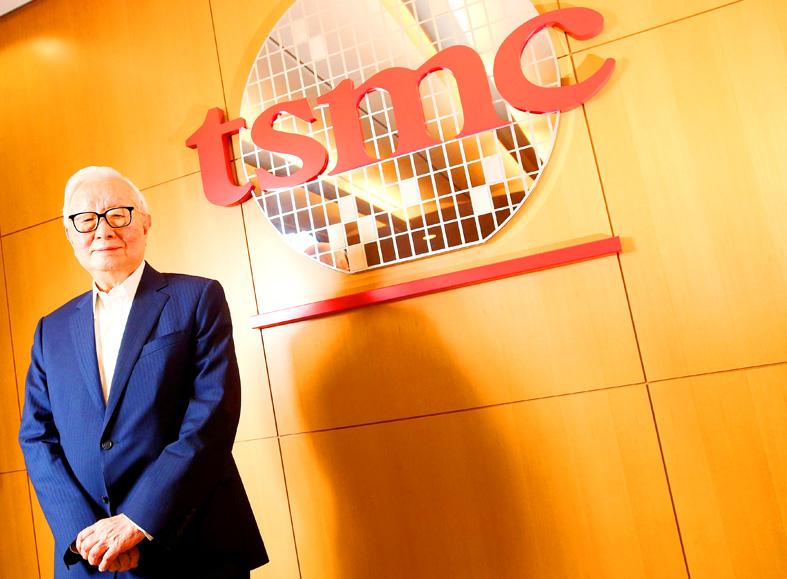The US’ efforts to increase onshore manufacturing of semiconductors is wasteful and an expensive exercise in futility due to a lack of manufacturing talent and high costs, Taiwan Semiconductor Manufacturing Co (TSMC, 台積電) founder Morris Chang (張忠謀) said on Tuesday.
Chang made the remarks in an interview with the Brookings Institution in its latest podcast on the theme “Can semiconductor manufacturing return to the US?”
The semiconductor veteran said that the US today still has a good position in the semiconductor technology industry in terms of chip design capacity, but it lacks sufficient manufacturing talent.

Photo: Reuters
“I don’t really think it is a bad thing for the US actually. But, it’s a bad thing for trying to do semi manufacturing in the US,” Chang said.
The US used to have strong talent, like Taiwan does now, he said.
However, after the 1970s, young talent in the US migrated to high-paying professions such as finance or consulting, rather than working for technology companies such as GE or IBM, he said.
Since then, US companies just could not get enough business school graduates, he added.
Another challenge is high manufacturing costs, Chang said.
For example, TSMC thought that its factory in Oregon, which was established in 1997, would have costs comparable to Taiwan, but that assumption was proved to be “naive,” he said.
TSMC has attempted to improve the factory’s performance by changing managers and engineers, he said.
While a few years of effort did improve the factory’s performance, the difference in cost between the US and Taiwan remains almost the same, he added.
Chips made at the Oregon factory cost 50 percent more than those make TSMC’s factories in Taiwan, Chang said.
Regarding TSMC’s new US$12 billion factory in Arizona, Chang said he had retired by 2019, but that chairman Mark Liu (劉德音) made the decision at the insistence of the US government.
TSMC, the sole chip supplier for Apple Inc’s iPhones, has said the Arizona factory is under construction, but aims to manufacture 5-nanometer chips by 2024.
Commenting on the US government’s efforts to increase onshore chip manufacturing by spending tens of billions dollars, Chang said: “I think it will be a very expensive exercise in futility.”
“The US will increase onshore manufacturing of semiconductors somewhat,” Chang said. “All that will be at a very high cost increase, high unit costs, but non-competitive in the world market when you compete with factories like TSMC.”
Regarding Intel CEO Pat Gelsinger’s remarks that “Taiwan is not safe,” Chang said he assumes that there will not be a war.
“If there is no war, then I think the efforts to increase onshore manufacturing of semiconductors is a wasteful and expensive exercise in futility," he said. “If there is a war, we all have a lot more than just chips to worry about.”

Micron Memory Taiwan Co (台灣美光), a subsidiary of US memorychip maker Micron Technology Inc, has been granted a NT$4.7 billion (US$149.5 million) subsidy under the Ministry of Economic Affairs A+ Corporate Innovation and R&D Enhancement program, the ministry said yesterday. The US memorychip maker’s program aims to back the development of high-performance and high-bandwidth memory chips with a total budget of NT$11.75 billion, the ministry said. Aside from the government funding, Micron is to inject the remaining investment of NT$7.06 billion as the company applied to participate the government’s Global Innovation Partnership Program to deepen technology cooperation, a ministry official told the

Taiwan Semiconductor Manufacturing Co (TSMC, 台積電), the world’s leading advanced chipmaker, officially began volume production of its 2-nanometer chips in the fourth quarter of this year, according to a recent update on the company’s Web site. The low-key announcement confirms that TSMC, the go-to chipmaker for artificial intelligence (AI) hardware providers Nvidia Corp and iPhone maker Apple Inc, met its original roadmap for the next-generation technology. Production is currently centered at Fab 22 in Kaohsiung, utilizing the company’s first-generation nanosheet transistor technology. The new architecture achieves “full-node strides in performance and power consumption,” TSMC said. The company described the 2nm process as

Shares in Taiwan closed at a new high yesterday, the first trading day of the new year, as contract chipmaker Taiwan Semiconductor Manufacturing Co (TSMC, 台積電) continued to break records amid an artificial intelligence (AI) boom, dealers said. The TAIEX closed up 386.21 points, or 1.33 percent, at 29,349.81, with turnover totaling NT$648.844 billion (US$20.65 billion). “Judging from a stronger Taiwan dollar against the US dollar, I think foreign institutional investors returned from the holidays and brought funds into the local market,” Concord Securities Co (康和證券) analyst Kerry Huang (黃志祺) said. “Foreign investors just rebuilt their positions with TSMC as their top target,

POTENTIAL demand: Tesla’s chance of reclaiming its leadership in EVs seems uncertain, but breakthrough in full self-driving could help boost sales, an analyst said Chinese auto giant BYD Co (比亞迪) is poised to surpass Tesla Inc as the world’s biggest electric vehicle (EV) company in annual sales. The two groups are expected to soon publish their final figures for this year, and based on sales data so far this year, there is almost no chance the US company led by CEO Elon Musk would retain its leadership position. As of the end of last month, BYD, which also produces hybrid vehicles, had sold 2.07 million EVs. Tesla, for its part, had sold 1.22 million by the end of September. Tesla’s September figures included a one-time boost in